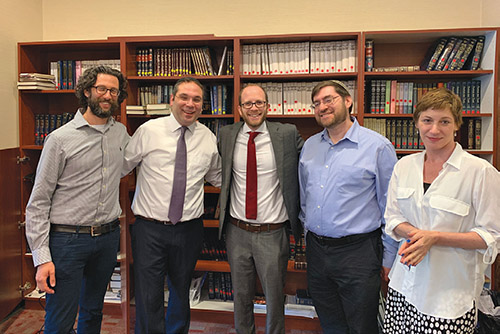


Yeshivat Frisch hosted a Yeshiva University Ideas Panel on May 22, titled “The Future of the Book.” The panel featured a series of presentations on the evolution of book technologies and their influence on Jewish learning, delivered by YU Associate Professor of Near Eastern and Jewish Studies Aaron Koller, Associate Professor of English Nora Nachumi and Assistant Professor of Computer Science Joshua Waxman.
Nachumi highlighted the enduring value of reading in the digital age. She showed students a clip from the film version of a Jane Austen novel and contrasted it with a paragraph from the original text, demonstrating how the text is able to accomplish a more vivid, emotionally resonant effect. A novel can give you the perspective of a character from inside and outside the character,” she said. “Films can’t do that because all the information you receive is from outside the character, from external signs.
Waxman’s presentation focused on the intersection of data and limudei kodesh. He discussed how data analysis can be used to map rabbinic authority and responsa. He has utilized data mapping to track relationships between amoraim and tannaim for his unique digital humanities project, Mi VaMi (mivami.org).
Koller took students back in time, discussing ancient “book” forms like cuneiform tablets and scrolls and how they made way for printed, bound books with multiple commentaries on the page—most notably, the 16th-century invention still in circulation, the Mikraot Gedolot. Koller noted that digital source databases like Sefaria, which compile thousands of sources in one place without any limitation of space, are still in their infancy and may yet change Jewish learning yet again. Still, he predicted that some things would remain the same. “You can make your own Mikraot Gedolot [with Sefaria],” he said. “But there will always be this idea of having multiple voices on the page. Jewish learning has long been about learning multiple different opinions at the same time, and I don’t think that will be soon to disappear.”
The event was attended by juniors in the honors track and organized by Rabbi Dr. Stu Halpern, senior advisor to the provost at YU.









